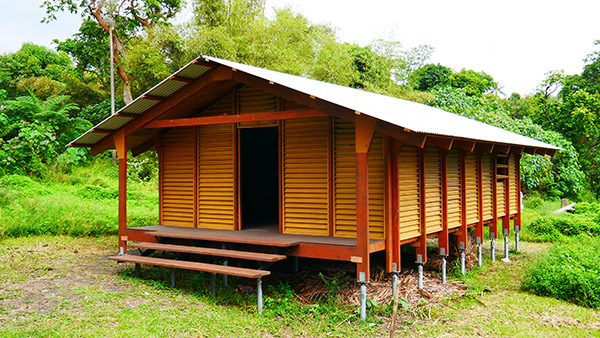
Rebuilding A Resilient Enkatalie
Rebuilding resilient communities after disasters
Rebuilding for resilience after disasters
The ‘Re-Building a Climate Resilient Enkatalie’ project emerged as a response to the devastating impacts of Cyclone Pam in 2015 on remote and rural communities on Tanna island, Vanuatu. The project aimed to rebuild the remote Enkatalie region of Tanna with sustainable (recycled plastic) cyclone-proof community structures that could also support local education, health and economic development goals.
The project is a collaboration between the Nevhouse and Green NRG Co., the Tafea Provincial Government, and the Tasol Land Management Committee, which represents 12 tribes from the north-east of Tanna who have come together to pursue joint development projects of their lands.
Fourteen structures were constructed in 2015-16 designed to withstand category 5 cyclones, and can also be used for different community activities, such as classrooms, work spaces for micro-businesses such as weaving and provide a space where the community members can come together to discuss issues concerning their communities. Each building includes a small-scale solar power system developed by Green NRG Co. In addition to enabling a safe house to shelter during cyclones, the project provided a source of electricity for the communities for the first time.

Above: Location of the huts on Tanna
Monitoring and evaluation
Griffith University was asked to provide independent monitoring and evaluation (M&E) of the project between 2016-2020, with particular attention to issues such as functionality of the buildings, how the buildings are being accessed and used, functioning of the small-scale solar systems, use of electricity by the communities, and the overall social and economic impacts of the new infrastructure to the communities involved.
The aim of the M&E is to identify challenges and successes and provide lessons learned for future projects that aim to work with local community and government stakeholders in Vanuatu and Pacific Islands towards sustainable and resilient infrastructure and rebuilding efforts. Between 2016 and 2019 the team conducted multiple site visits to inspect the infrastructure and consult with the community users to identify the performance across a range of social and technical criteria.
Training
In late 2019, researcher and community engagement coordinator Melissa Jackson and project director Brendan Mackey, together with Tanna community Elder and leader Mr Alan Dan, delivered two days of training to forty-five community members about the basics of small-scale solar power systems and how to safely maintain and operate the power systems.
This training was identified as an important outcome from the M&E component of the research as part of the ongoing sustainable management plan, and to allow the community to effectively use the locally generated electricity and lighting to support a range of activities such as night-time use of the buildings for women to continue weaving mats and bags that can be sold at market. The training module was given in English, Bislama and local languages in and around the community buildings and women were encouraged to attend as important.
The training was received well by the communities who asked for further training and capacity building for their communities to be able to have more control over the long-term systems.